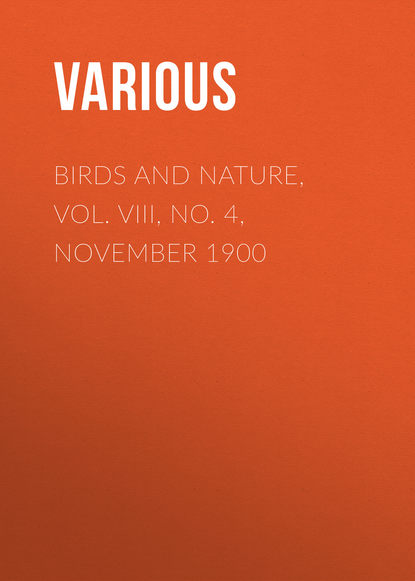 Полная версия
Полная версияBirds and Nature, Vol. VIII, No. 4, November 1900
Bitter almonds contain a very poisonous volatile oil in addition to the fixed oil just described. In small quantities this oil finds a use for flavoring by the cook and confectioner, and by the perfumer for scenting toilet soaps and for other purposes. This oil is obtained by distillation after the fixed oil has been expressed. It is the product of the decomposition of amygdalin under the influence of emulsin and water. The poisonous properties of this oil are due to the hydrocyanic acid which is present. This acid may be removed and the oil is then known as purified oil of bitter almonds. Even the purified oil is not safe, as it decomposes quite readily unless all of the water is removed by the use of fused chloride of lime.
The symptoms of poisoning from the oil of bitter almonds, or from a quantity of the bitter almonds, are the same as from a dose of hydrocyanic acid. Medicinally the oil is used like hydrocyanic acid in various disorders of nervous origin, as whooping cough, spasmodic troubles, etc.
Sweet almonds are variously employed. Roasted and salted almonds are very much liked by everybody. Almonds for the table must first be "blanched," that is, the outer, reddish brown, thin seed coat must be removed, as it contains irritant properties. They are used in making cake and other pastry. Cake or bread made from almond meal has been recommended as a substitute for ordinary bread in the treatment of diabetes, as it is free from starch, a food substance which proves harmful in this disease. Almond cake is a term applied to the crushed seeds from which the oil has been expressed. Finely-powdered this is used for washing hands and face. Almond paste is a cosmetic made from powdered bitter almonds, white of egg, rose water and rectified spirits. It is used to soften the skin and prevent chapping of hands. An emulsion of sweet almonds is also used as a substitute for milk in feeding infants.
Albert Schneider.Nature, the Vicar of the Almightie Lord.
– Chaucer, "The Assembly of Foules."All Nature is but art, unknown to thee;All chance, direction, which thou canst not see;All discord, harmony not understood;All partial evil, universal good;And, spite of pride, in erring reason's spite,One truth is clear, whatever is, is right.– Pope, "Essay on Man."Nature is a frugal mother, and never gives without measure.
– Emerson, "Essays."But who can paintLike Nature! Can imagination boastAmid its gay creations hues like hers?– Thompson, "Seasons."


